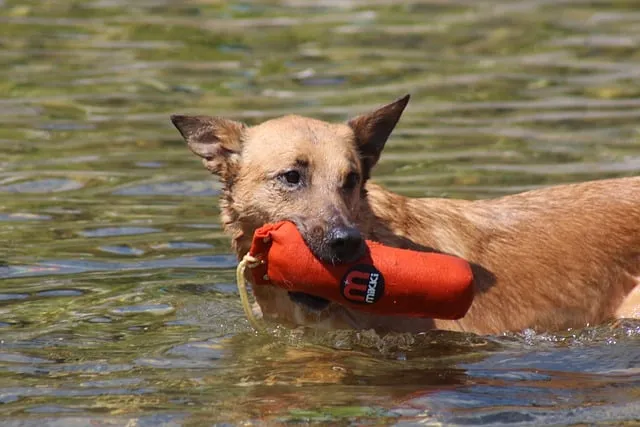The Belgian Malinois is a highly energetic, strong, and robust breed. A full-grown Belgian can weigh from 40 to 80 pounds and their life expectancy is around 14 to 16 years.
They were originally bred for herding and have a super hard-working attitude while thriving on being active.
This high activity level is rarely curbed because the Belgian Malinois is a relatively healthy breed. That being said, the Malinois can experience health issues just as any breed can.
Everyone, at one time or another, has had stomach problems of different types. and dogs are no exception.
Most issues are common and quickly pass while others can be complicated or even severe.
For mild stomach upsets, we humans often reach for the “plop, plop, fizz, fizz, oh what a relief it is” aid of Alka-Seltzer or use Pepto Bismol, Imodium, or Kaopectate. Can these remedies be used for dogs?
In this post, I will give you the answer to that question along with information on Belgian Malinois digestive problems as well as Belgian Malinois diarrhea.

For your dog’s vitamin supplement, food, toys, or other dogs product please visit the Sunday’s for dogs website.
Belgian Malinois Digestive Symptoms
Although your Belgian Malinois is probably pretty healthy, they may, on occasion, suffer from various digestive problems but most will be mild and short-lived.
Below are some symptoms of gastrointestinal problems. Many are the same as we humans experience at one time or another.
These symptoms can be simply caused by something your pupate or have an underlying cause.
- Nausea
- Vomiting
- Gas in Excess either a rumbly tummy, burping or passing gas
- Diarrhea
- Constipation
- Weight Loss ( due to vomiting and/or diarrhea)
- No Interest in Food
- Dehydration
- Dry Heaves
- Excessive Panting or Shaking
Belgian Malinois Digestive Problems
Below are common digestive problems that your Belgian Malinois could develop.
Worms
Even though your Belgian Malinois has been wormed as a puppy, each time you visit your veterinarian for wellness visits, they will usually ask you to bring a stool sample.
They will check the sample for worms and other parasites. Dogs do eat the most disgusting things on their travels and you may be distracted or unaware of this.
Your pup can not only get sick but end up with worms. Worms can cause illness and even eventual death without treatment.
Hookworms suck the blood of dogs internally and can cause death, especially in puppies. Tapeworms absorb precious nutrients from your pup’s food, leaving them deficient in these.
Whipworms are not as harmful but still need to be eliminated. Treatment for worms depends on the type of worm.
Gastritis
Gastritis is caused by the ingestion of toxins or your pup eating out of the garbage can. This inflames the lining of the intestines and often causes infection.
Symptoms are diarrhea, vomiting, abdominal pain, fever, disinterest in food or water, weight loss, and lethargy.
Gastritis can be fatal if left untreated. Withholding food for one to two days may be necessary to treat this.
A bland diet should be started after the two days, gradually. Water can be given to your Belgian to prevent dehydration.
If your pup can not even hold the water down, you should seek help promptly from your veterinarian or an animal clinic or hospital. IV fluids may be needed as well as anti-nausea meds or antibiotics.
Inflammatory Bowel Disease IBD
IBD or inflammatory bowel disease is similar to human IBS (irritable bowel syndrome) but is chronic, which means constant and recurring.
IBD is an inflammation of the digestive tract caused by underlying damage. This is an ongoing disease that may have bouts of diarrhea, vomiting, loss of appetite, and weight with times of remission. IBD is managed by a healthy diet that is soothing and non-irritating and also with medication.
Pancreatitis
Pancreatitis can be a severe disease in dogs. The pancreas releases digestive enzymes needed for indigestion to break down food.
In pancreatitis, enzymes are released too soon and begin to destroy the pancreas. Symptoms are abdominal pain, continuous vomiting, no interest in food, weakness, and lethargy.
This is treatable with IV fluids, medications, and sometimes surgery, but your dog’s outcome depends on how swiftly pancreatitis is diagnosed and treated.
To check your Belgian Malinois health status or their DNA, please visit the Embark vet website for all the help you may need.

Exocrine Pancreatic Insufficiency
Another disease of the pancreas, exocrine pancreatic insufficiency develops when your pup does not make enough digestive enzymes to break down and digest food.
Symptoms are chronic diarrhea, an increased appetite caused by food going right through them, weight loss, and lethargy.
Dogs suffering from this area are in a way starving because they are not getting proper nutrients for energy.
Treatment is a soothing diet and replacement of digestive enzymes in powder form added to your pup’s food.
Belgian Malinois Diarrhea
Diarrhea is certainly not uncommon in dogs and most times there is no cause for concern and it resolves on its own.
Also, diarrhea can be from the large intestine, the small intestine, or in the case of pancreatitis, outside the intestines.
Large Intestinal Diarrhea
Loose stools will be passed more often with straining and there may be blood or mucous in the stool. Usually, there will be no vomiting. Causes can be:
- Stress
- Ulcers of the colon
- IBD
- Whipworms
- Polyps
- Colon cancer
Depending on the diagnosis, treatment may be an addition of a diet high in fiber, anti=inflammatory drugs, worm medication, or surgery.
Small Intestinal Diarrhea
In small intestine diarrhea, large amounts of stool will be passed with frequency without straining. Your Belgian may experience vomiting, and gas.
The causes of small intestine diarrhea are listed below.
- Bacteria like campylobacter, salmonella, or clostridia.
- Giardia or worms (mostly in puppies)
- Canine parvovirus or distemper if puppies were not properly vaccinated.
- Change in diet from junk food, eating garbage, etc.
- Histoplasmosis, a fungal infection
- IBD
- A foreign object lodged in the intestine is like a stick or bone splinter. This can cause vomiting and diarrhea as well as pain and could develop into a medical emergency.
- Intestinal Tumors, mostly in senior dogs.
Treatment For Belgian Malinois Diarrhea
Treatment for diarrhea in your Belgian Malinois will depend on the cause. Dogs do get diarrhea from time to time and are no big deal, going away on their own.
Treatment may be withholding food for 24 to 48 hours and then slowly introducing a bland diet.
To answer the question about over-the-counter drugs for diarrhea in dogs, your veterinarian may suggest giving your pup Pepto Bismol, Imodium, or even Pepcid, but they will give you the correct dosage to use.
Don’t administer these to your dog without first speaking with your veterinarian. Never give your pup Alka-Seltzer. This contains aspirin and is poisonous to dogs!
In more concerning cases of diarrhea, treatment depends on the cause. Tests or hospitalization may be necessary to reach a diagnosis or for more in-depth treatment. Your Belgian Malinois may need different types of meds or in severe cases, surgery.
If your Malinois has an underlying condition, this may be managed with medication and/or a change in diet.
Your Belgian Malinois will experience occasional bouts of stomach upset with vomiting and/or diarrhea.
You can often avoid this with a high-quality diet and by keeping snacks to a minimum. Human junk food and table scraps should be avoided at all times because these are a big culprit of stomach woes that can become chronic.
Be aware of the symptoms above, especially those that continue or are severe. Don’t hesitate to contact your Belgian veterinarian if symptoms do not go away and become worse.
You know how your Malinois normally acts and if their behavior is out of the ordinary. If you sense something is amiss seek help quickly.